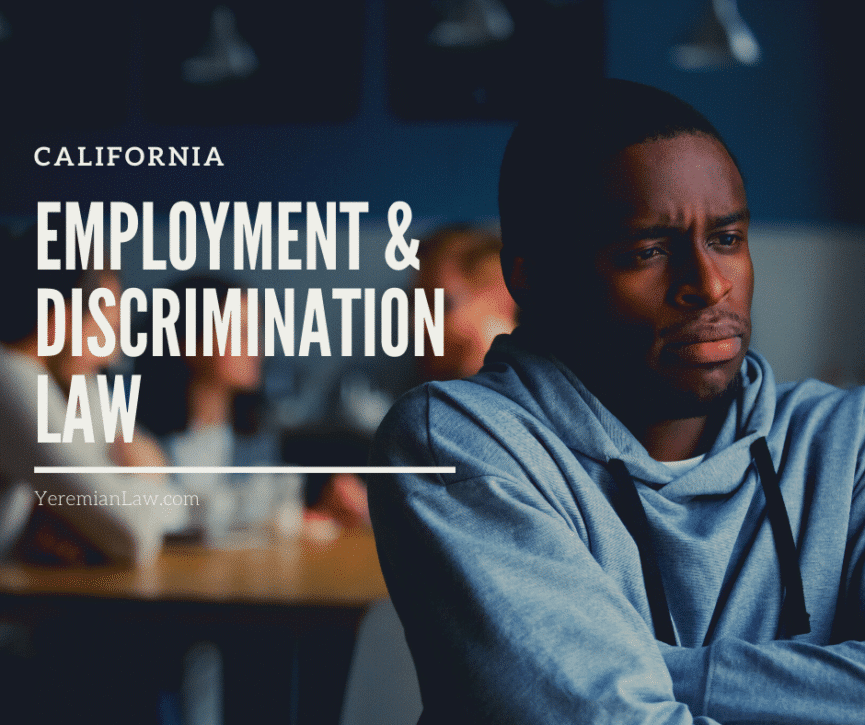The Department of Fair Employment and Housing, or DFEH, handles California employment discrimination law and its enforcement. Discrimination occurs when someone receives less favorable treatment because they have a specific characteristic – one that’s protected by law – and if it’s happened to you, you could have legal recourse.
California Employment Discrimination Law and Its Enforcement
 California’s Fair Employment and Housing Act, commonly called FEHA, applies to employers that have five or more employees. Usually, when people file complaints, they go through the Department of Fair Employment and Housing to do so.
California’s Fair Employment and Housing Act, commonly called FEHA, applies to employers that have five or more employees. Usually, when people file complaints, they go through the Department of Fair Employment and Housing to do so.
Discrimination can look different in various situations, but the most common cases involve things like when an employer:
- Refuses to hire or promote someone because that person has a protected characteristic or is a member of a protected group
- Demotes or fires someone who has a protected characteristic or is a member of a protected group
- Refuses to reasonably accommodate an employee’s disability-related or religiously-related needs
- Adopts company policies that disproportionately affect workers who have protected characteristics or are members of a protected group
- Allows severe, pervasive harassment in the workplace
There are federal laws against discrimination, too.
Federal Laws Against Discrimination
Several federal laws apply when it comes to workplace discrimination in our state, including the:
- Civil Rights Act of 1964
- Americans With Disabilities Act
- Equal Pay Act
- Age Discrimination Act
- Genetic Information Nondiscrimination Act
Discrimination is against these federal laws, as well as against FEHA. The Equal Employment Opportunity Commission – called EEOC for short – is the federal agency responsible for enforcing and administering these laws.
Which Applies to Your Situation: Federal or State Law?
 California employers are required to comply with the law that provides the most comprehensive protections for workers. That means if California law provides you with more protections, that’s the one your employer must follow. Likewise, if federal law provides more comprehensive protections, your employer must follow it.
California employers are required to comply with the law that provides the most comprehensive protections for workers. That means if California law provides you with more protections, that’s the one your employer must follow. Likewise, if federal law provides more comprehensive protections, your employer must follow it.
That also means that both federal and state law may protect you in your situation.
Legal tip: Federal law often only regulates larger businesses, but state law often covers smaller businesses. For example, California law applies to businesses that have five or more employees – and that’s fewer than necessary to get federal protections.
Types of Discrimination Claims
Usually, discrimination claims fall into one of two categories: disparate treatment discrimination and disparate impact discrimination. Your attorney can explain your situation in more detail, but generally, most cases fall under these categories.
Disparate Treatment Discrimination
This type of discrimination occurs when an employee is treated differently because of a protected characteristic or membership in a certain group.
Disparate Impact Discrimination
This type of discrimination occurs when an employer adopts a policy that has a disproportionate impact on employees who have certain protected characteristics or membership in a certain group.
California Employment Discrimination Law and Its Enforcement: Workers Affected
Not all workers are protected under California employment discrimination law (and its enforcement isn’t possible if the law doesn’t apply). Usually, a person must be an employee or a job applicant in a legal sense to receive the protections the laws provide.
- An employee is a person who works under the employer’s direction and control.
- A job applicant is someone who files a written application with an employer.
There are special circumstances, too, such as when a person is driven away from applying for a position because the employer has discriminatory practices, California employment discrimination law may still apply to them.
What About Independent Contractors and Harassment?
 Harassment falls under California employment discrimination law, and while independent contractors are not eligible for most protections the law provides (due to the nature of their employment), they are protected against harassment. If you’re a contractor experiencing harassment, it may be a good idea to contact an attorney.
Harassment falls under California employment discrimination law, and while independent contractors are not eligible for most protections the law provides (due to the nature of their employment), they are protected against harassment. If you’re a contractor experiencing harassment, it may be a good idea to contact an attorney.
Do You Need to Talk to an Attorney About California Employment Discrimination Law and Its Enforcement?
If you believe your employer has violated California employment discrimination law, we may be able to help you. Call us at 818-230-8380 for a complimentary consultation. We want to hear what happened to you and determine whether you have a case.




